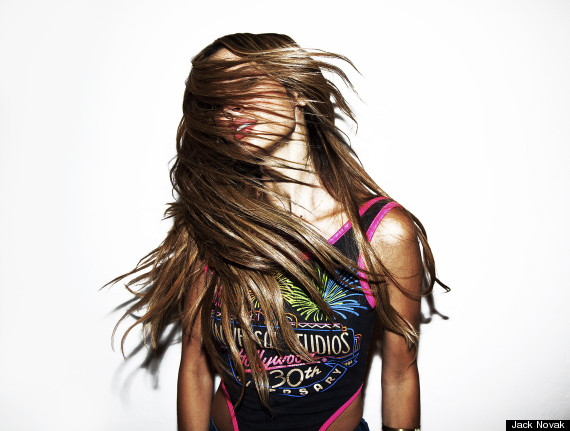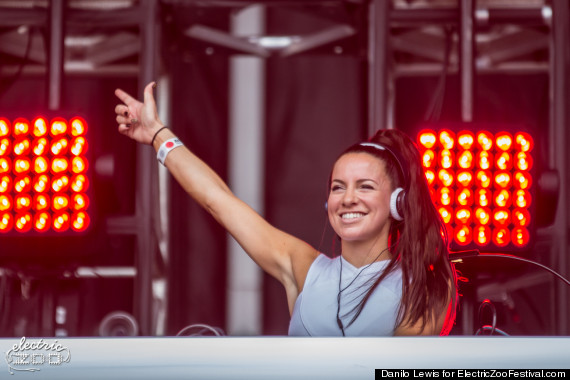This is the second part of a two-part series on female DJs and the stereotypes they encounter. Read the first part, "Breaking The Myth Of The Female DJ In Electronic Dance Music," on HuffPost Entertainment.
"I want to inspire other women and girls to go out and realize that they can DJ without having to DJ in their bra. That they can go out and make their own music and make their own beats and don't have to have anyone do it for them. It can be about real musicianship," Los Angeles-based DJ and producer Jack Novak said.
As a woman in the male-dominated electronic dance music (or "EDM") industry, Novak feels like she's in an interesting place. Only 10 percent of performers at music festivals around the world are female, according to a recent analysis conducted by an international coalition of female artists. The percentage is even less for women listed on music label rosters.
(Story continues below.)
Jack Novak poses for a photo shoot in a picture she provided to The Huffington Post in September.
Novak -- whose name is actually Jacqueline but who prefers to be called Jack, her childhood nickname -- recalled a particular time she was plugging her MacBook into a club's Serato and VJ systems when a booking agent for the venue came to check on the setup. "Are you Jack's girlfriend?" he asked.
The question was surprising to Novak. Did the agent not know he had booked a female DJ? Apparently not.
The 27-year-old said that some of her fans have made the same assumption. It wasn't until a blogger published a photo of Novak standing in her home studio in May that many realized Jack is a woman.
"It's funny because that [blog post] came out, and some of my fans came out and said 'I'm in shock right now,'" Novak said during a recent phone call. She confessed she didn't like the photo that had been used in the article. Being a DJ in the EDM industry should be about musicianship and not image, she suggested.
Though Novak looks every bit the model with her statuesque frame, she doesn't want to be singled out for her appearance or what she's wearing -- like the so-called "it-girl" DJs or the models who often play at clubs and celeb-studded events.
Jack Novak's video for one of her tracks, "I Know Sosa."
Novak and other female DJs in EDM have had to deal with their fair share of frustrations based on their gender. The difficulties appear to stem primarily from two stereotypes: that women lack the technical abilities to DJ and produce, or that they're expected to look a certain way.
Earlier this year, dance music website Resident Advisor released a documentary video that follows Siberian-born DJ Nina Kraviz as she tours Europe for three days. The 11-minute feature was heavily criticized by online commenters and industry vets for its portrayal of Kraviz. In one scene, she gives an interview in a bubble bath.
"Female DJs have always found themselves sexualised in a way that the men have never had to endure," former U.K.-based DJ Greg Wilson wrote on his blog after the video was released. "[When Nina] allowed herself to be interviewed in a manner that many people would say played right into this stereotype, firstly bikini clad on a beach, but most contentiously, submerged in a bubble bath, she really set the cat amongst the pigeons."
After Wilson's post, Kraviz responded to the criticisms on Facebook, relaying her displeasure with Resident Advisor for focusing too much on her gender.
“[S]ometimes I just wanna scream into the Universe: ‘Guys, are you serious?’” she wrote in a lengthy status update. “Aren't you not bored about this 10 times dead topic about females in the industry, the idea that any boy can do what ever he wants and it's all fine and girl needs to behave? ... Sexism and all similar bullshit must die. And the first step to it is to let artists be who they are regardless of their gender, skin color, sexual orientation ect [all sic].”
Kraviz's comments are not unfounded. Though she took issue with critics' judgments -- "This video is about [a] dj on the road. And djs take baths sometimes," she wrote -- Resident Advisor's choice to include the contentious scene may feed into the stereotype that, as female DJs, women must indulge certain expectations about their appearance in order to excel.
Branding And Image
"You get all of these sort of social stereotypes of female DJs -- that they're fake or they're like a Playboy playmate," Brittney Bowles, aka Brazzabelle, explained after her opening set at New York dance music festival Electric Zoo over Labor Day weekend.

Brazzabelle performs her set on the eastside main stage for day one of Electric Zoo 2013 in New York City on Aug. 30, 2013. (Danilo Lewis for ElectricZooFestival.com)
Though Brazzabelle, who was wearing a silver sequin skirt and heeled sneakers along with a high ponytail, certainly doesn't hide her femininity, she says she never really feels like a "girly girl."
"So this is like the third manicure I've ever gotten in my life," she said, playing with her long, black acrylics that had her logo emblazoned in gold on alternating nails. She had gone with a friend to have them done before her Electric Zoo set, since it was a special occasion -- the first time she's played in New York.
Choosing to dress for the stage as a female performer is sometimes not without backlash. The Arizona-born Brazzabelle, who now resides in LA, revealed that she's been the frequent target of online abuse. Commenters on social media have posted derogatory remarks on her photos, belittling her as a DJ and mocking her technical abilities. She recalled one particular comment that suggested she merely turned the CD bay on for the real DJ.
But instead of feeding the flames, Brazzabelle chooses to ignore them.
"It's kind of a daily struggle to prove myself, but I don't let it get me down," she added. "I think if you have haters, you're doing something right."
Dr. Robin James, who has studied feminist aesthetics in popular music, says the stereotype that female performers are onstage as some sort of spectacle is not limited to EDM.
"It seems to me that what's happening is a sort of rehashing in somewhat new ways of the same old problems," James, an associate professor of philosophy at the University of North Carolina at Charlotte, said over the phone.
In her research, James has encountered similar gender disparities and issues of both hypersexuality and non-sexuality among women in rock and hip-hop. She pointed to examples in Lil' Kim's over-the-top presentation (think 1999 MTV Video Music Awards) in comparison to Missy Elliot tracksuits and sneakers.

"Guys will want a female singer or a hot chick onstage," James summed up in a broad generalization of the music industry. "When we're talking about stuff that happens behind the scenes, like production, the audience will not physically see the producer."
However, in recent years, she has observed DJs coming out from behind the curtain and acting more like rock stars. So, the same gender-based stereotypes that existed among female rockers in the 1990s and, more recently, women in hip-hop, ring true for females in EDM.
James links these stereotypes to society, and she doesn't expect the dance music industry to change for the better without a radical shift in culture.
Music, Not Gender
With her masculine-sounding name, Deniz Kurtel, like Jack Novak, is sometimes mistaken for a man. (Deniz is pronounced "Denise," rather than "Dennis.") However, she says she has never experienced a negative social stigma as a female in the industry.
But that's not to say she hasn't heard stories from friends.
"Producing electronic music is ... not so hard," Kurtel said over the phone in her rich Turkish accent. "It's not such a crazy thing that anyone who becomes successful because she's a woman."
Kurtel added that she knows a lot of male producers hold the belief that women who become successful do so because they're women. "That's kind of pathetic," she concluded.
Deniz Kurtel performs in May 2013 at the Boiler Room in London, one of several clubs around the world that host live streams of DJ sets.
The Turkish-born DJ was in the midst of pursuing graduate degrees in policy analysis and statistics at universities in New York when she started making art, particularly LED installations. After that, she said, it was pretty clear what she wanted to do.
Her artistic experience carried over to music, and a friendship with Brooklyn-based DJs Wolf + Lamb inspired her to start producing in 2007. Two years later she had an EP and an agent who pushed her to start DJing -- first at larger clubs, then at smaller venues, which she much prefers -- to support the album.
However, for Kurtel, the talk of stereotypes surrounding women in the industry is not a personal concern.
"I just focus on whatever music I really want to make," said Kurtel, who separates herself from other DJs by refusing to play any music but her own. "I don't really focus on the female-male thing. ... It's no different in music than it is with things in other industries. ... Things like this exist in every industry and it's just the reality of where women are in society. But it's going to get better and better with time."
'Female DJ'
Gender may be readily apparent when women DJ at music festivals and spin at clubs or in music videos, but that doesn't mean they want to be known as -- or labeled -- a "female DJ."
"To be perfectly honest, I'm not a huge fan of it. I hate that it's female DJ," Jack Novak said of the term. "I don't want to be singled out as a woman. I want to be rewarded on my own merit."
Novak is not alone in her dislike of the gendered label.
Jenny Feterovich, one of two women behind "Girls Gone Vinyl," an ongoing documentary inspired by a girls-only DJ night of the same name, said many of the DJs she has interviewed shy away from being identified as female.

"A lot of girls have bad experiences and they kind of transfer it onto this whole thing like I don't want to be associated with that," the Russian-born DJ said during a phone call. "But, at the end of the day, we are women."
Instead of abandoning the term, Feterovich and filmmaking partner-promoter Maggie Derthick choose to embrace "female DJ" and hope to squash the stigma associated with it. For them, being a female DJ is not about looks, but sheer talent.
"You definitely won't see any models DJing in our lineup," Feterovich said of the annual females-only DJ event, referring to hobbyist DJs with modeling contracts.
Well, with one exception: "Unless they're really, really good," Derthick offered.